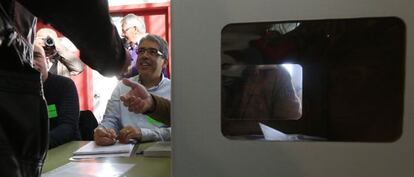Catalonia says “international battle” over independence still to be won
Regional government keen to whip up more foreign support for an official referendum

A day after Catalonia held its informal vote on self-rule, regional leaders said they would use the positive results to try to convince not just Madrid but also the rest of the world about the need for a new, more official referendum on independence.
“There is a battle to win, which is the international battle, the battle of the states,” said Catalan government spokesman Francesc Homs on Monday morning.
Although the regional executive has vaunted the presence of international observers during Sunday’s vote, Homs admitted that support abroad was still scant.
The fact that not all voters said yes to independence gave legitimacy to the vote, said Homs
“Evidently this can be won, and it will be won through specific attitudes such as the will to negotiate, a civic demeanor and an openness to dialogue,” he said.
Homs also underscored the fact that not all voters who came out on Sunday said yes to independence: around 20 percent supported either a mixed system involving a Catalan state that would nevertheless be a part of Spain, or no to any form of independence. This, said Homs, gives legitimacy to the process: “It wasn’t the kind of vote they have in North Korea.”
Meanwhile, the regional government of Artur Mas is to send Prime Minister Mariano Rajoy a letter requesting it to allow a legal, binding referendum.
Homs did not disclose the exact content of the letter but said that if the central government continued to refuse the possibility of a legal referendum in Catalonia, then regional authorities would press ahead with the sovereignty process on their own.
“Being open to dialogue does not mean we’re going to stop doing what we have to do,” he said.
One option on the Catalan executive’s table is to hold early elections in the region that would act as a plebiscite on the independence issue, in that it would show the level of support for Artur Mas. “There is that possibility, if there is no way of agreeing on a referendum,” said Homs.
The spokesman also criticized Rajoy and his Popular Party administration, whose legal action against the original Catalan referendum on self-rule effectively reduced it to a “participatory process” with no legal backing.
“It’s disgraceful how he [Rajoy] said that this was neither a referendum nor a consultation. We cannot let them keep acting this way, in such a hostile and undemocratic way.”
Tu suscripción se está usando en otro dispositivo
¿Quieres añadir otro usuario a tu suscripción?
Si continúas leyendo en este dispositivo, no se podrá leer en el otro.
FlechaTu suscripción se está usando en otro dispositivo y solo puedes acceder a EL PAÍS desde un dispositivo a la vez.
Si quieres compartir tu cuenta, cambia tu suscripción a la modalidad Premium, así podrás añadir otro usuario. Cada uno accederá con su propia cuenta de email, lo que os permitirá personalizar vuestra experiencia en EL PAÍS.
En el caso de no saber quién está usando tu cuenta, te recomendamos cambiar tu contraseña aquí.
Si decides continuar compartiendo tu cuenta, este mensaje se mostrará en tu dispositivo y en el de la otra persona que está usando tu cuenta de forma indefinida, afectando a tu experiencia de lectura. Puedes consultar aquí los términos y condiciones de la suscripción digital.








































